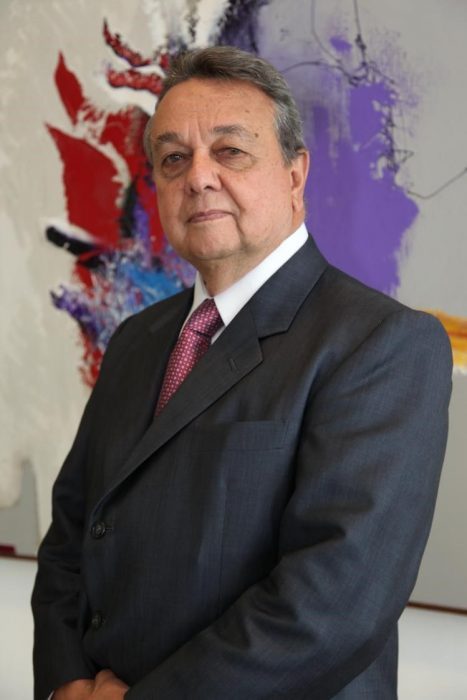Grão Especial spoke exclusively with former Minister of Agriculture, Livestock and Supply, Roberto Rodrigues.
He is an agronomist and farmer, and current coordinator of the Agribusiness Center at the São Paulo School of Economics, for the Getúlio Vargas Foundation (FGV EESP) and FAO Special Ambassador for Cooperatives.
With an extensive curriculum, the former minister spoke about agriculture and cooperativism, two themes he is passionate about.

former Minister of Agriculture, Livestock and Supply, Roberto Rodrigues.
Check it out:
Grão Especial – The world believes – Brazilians as well – that our agriculture is based on large properties, large estates, when, in fact, the vast majority of them are small family farms. In specialty coffee, for example, about 80% of the properties are small. But international buyers, whether they are roasters or coffee shops, believe that there are only big farms here, and they end up preferring to buy from other countries because they think that Brazilian coffees have few attributes: chocolate, almonds and nothing else. How to change this perception?
Roberto Rodrigues – Look, I have been working in Agribusiness for 30 years and I can tell you that our incompetence in communication is the most traditional thing in the sector. We are great at talking to ourselves, praising ourselves, and terrible at doing this internationally. Recently, a report was published by the Organization of Brazilian Cooperatives (OCB), which points out that about 52% of Brazilian agricultural production goes through cooperatives. And 80% of the cooperative members are small producers. But it is a kind of modus operandi in the sector. You have to bring in people from outside to meet the cooperatives, and they take you to meet the small associated producers. Yet, this is something for the private sector to resolve, as it has nothing to do with the Government.
When I was FAO (United Nations Food and Agriculture Organization) Special Ambassador for cooperatives, I visited farms around the world. Once, in Africa, they took me to visit some and it was always the biggest, the most beautiful, but I didn’t want to. I wanted to see the truth! Here in Brazil, many and many times I would receive a minister or deputies at the farms. The owner would go there, before the visitors arrived, and paint it all, mowing the lawn until it looks beautiful. But that is not the rule; it is not normal procedure. We need to get people to know the average reality of the farms. You have to tell the truth! Virtue is in the middle and the model is via cooperatives.
Grão Especial – As a great expert on the subject of Cooperatives, how are we in this regard compared to other countries? Are we below anyone’s level?
Roberto Rodrigues – Well, this question is worth a lecture. But I will try to answer it: when I was president of the Organization of Brazilian Cooperatives (OCB), I visited 79 countries, spread across all continents. First of all, one must explain that Cooperativism is a universal doctrine, with seven principles that are applied in all countries of the world. The cooperative is the portrait of the society in which it operates. If you are in a region where there is culture in the broad sense of the term, there is a sense of developed collectivism; cooperatives are a success. If the Government’s presence is very strong, it will vanish away. Cooperatives are the human face of the economy. If there is a real feeling, it goes well. The answer to your question is: it depends. In Brazil, we have several realities: if we talk about the south of the country, in the states of Paraná, Santa Catarina and Rio Grande do Sul, we can say that the cooperative movement is the most advanced one worldwide. But not all places are like that.
In the Cerrado, in the center of the country, it is weak, there are large properties, the farmer is rich, so they need fewer cooperatives, they make their profit on the scale, which small producers cannot do. In a globalized economy, the producer’s profit margin is increasingly smaller. Worldwide, producers make their profit on the scale. How to survive then? Scale with your peers in the cooperative. That is why they need their peers from within the cooperative to be able to scale, to have access to technology, production processes, exports etc. The cooperative is dominant for the small farmer’s progress.
Grão Especial – What does it take for a cooperative to work?
Roberto Rodrigues – The Cooperative is a company that has values, principles, being an instrument for growth and having to be economically feasible. You must have a leadership. Finally, for a Cooperative to work, three situations are essential: the first one is that it is necessary, that is, they have to be aware that they need a cooperative. It is up to the movement to proselytize so as to make people feel attracted. The role of the state is education; on the other hand, it must lead and be economically feasible. I’ll give you two examples: In 1964, the military had a strategic vision of occupying territorial spaces in the country and, for that, they created cooperatives in the central-western Amazon, called CIRAS, Integrated Agrarian Reform Cooperatives, chaired by an Incra technician. There was no trust relationship among the cooperative members. They closed them all and none survived.
Another example: former Argentine President Raúl Alfonsim (1983-1989), was a Democrat, loved equitable cooperativism, to distribute income. He created, together with his office, a department to create cooperatives with government subsidies. They are all over. It can’t be created from the top down. It just doesn’t work.
Grão Especial – Is it possible to make Brazil an agricultural success, with a fair income, for small producers, with fewer commodities and more special products? What is missing for us to take this step?
Roberto Rodrigues – A difficult question to answer. It depends, fundamentally, on strategies, on public policies. Large companies develop technologies, seeds, pesticides, research, make huge investments. They wish a return, obviously. So, you see a lot of research on soy, corn, coffee. Now, it is difficult to find someone researching sunflower, for example, even in government research bodies. I think it has a little to do with our training there must also be a state strategy, targeting these niches, which are very important.
Poultry farming is an impressive thing. The state of São Paulo alone produces 15 billion eggs a year. Today, it has the extraordinary niche in the market, the so-called “cage free”, without a cage. What happens here? The egg is probably tastier, more colorful and costs a lot more, being less sustainable. It is much riskier to the health than concentrating chickens in the cage. In order to move forward, there has to be a lot of research for this, but there isn’t because there is no agronomic interest. To look for specific, special niches, with special themes, with interesting feedback, you have to have the Government’s authorization. If you leave it up to the market, it won’t happen.
Grão Especial – Food Security is the theme of the moment. Can you see any relationship between the theme and the production of niche products?
Roberto Rodrigues – Yes, there is that relationship. I think that in the early the 2000’s, the UN started to talk about the topic, for obvious reasons. There is only peace without hunger. I started talking about it 20 years ago, making it compatible with the theme of preserving natural resources, and the obvious answer was technology. The challenge for humanity in the 21st century would be to make quality production compatible with preservation. And the answer was technology. The pandemic came and reinforced the issue of food security, but, simultaneously, with sustainability. The pandemic opened two clear windows for the future: sustainability and food security. Youth around the world are concerned with preserving the environment. It is not fashionable. It is dogma. This theme will prevail for 40 years and will continue to address this issue. I think this is wonderful. The problem is to separate the chaff from the wheat.
Brazil has a relevant role and the two issues, Food Security and Sustainability, go through agriculture. We have to work with strategies. Brazil produces and exports almost a third of all coffee consumed in the world, and exports less than 2% of roasted and ground coffee. The countries that buy it, create a tariff scale for the countries that buy, each of them defending themselves as they can. If anyone wants to export roasted grain, they will die on the beach, because the rules of world trade are strict, which is a problem of state, of public-private actions, each at their own level. Brazilian agriculture has its back to Brasilia, but it is facing the market. And Brasília is concerned with other matters.
Until the 1970s, Brazil had coastal agriculture, consumption and ports were coastal. In 1971, we bought a soy and sugar cane farm in the Cerrado. My father, who was a brilliant agronomist at the time, said to me: Cerrado never again, neither given nor inherited. That was the advice from 50 years ago. Embrapa came and the cerrado became the Maracanã where the final game of the food world cup will be played. And we will win, with sustainability! And it helped to preserve the Amazon, thanks to the Cerrado. Gaúchos, paranaenses, mineiros, paulistas, nordestinos, this great mixture brings about the hybrid vigor. It is an extraordinary team.
Grão Especial – What to do to really punish producers who do not respect the forest code?
Roberto Rodrigues – There is only one thing to do: you have to comply with the law. Deforestation is illegal and must be punished with the strictness of the law. Breaking into someone else’s land and gold miners have to be punished. Arson has to be punished. Even nowadays, the forest code has not been implemented. It must be complied with. There is an owner who has been waiting for the documentation of their lands for 40 years. Without it, they cannot borrow from the bank, for example. This is a legality issue and the State has to intervene and punish those involved. There must be people inspecting, by planes, boats… this is a crucial problem. And there must be an integrated action between all the powers and the private sector. But I recognize that it is difficult. We are a poor country and we do not even have basic sanitation. There must be a great articulation between the powers.
Otherwise, farmers who are doing everything within the law will end up being threatened by criminals and adventurers. And you have to recognize what is wrong and correct it. One cannot argue that it does not exist.
Grão Especial – Can special cocoa be a big bet for Brazil? Interest?
Roberto Rodrigues – I don’t know if it matters to the current government. When I was minister of agriculture, I implemented several actions. I think cooperatives are great solutions. It’s a little bit like coffee. There must be a public-private strategy.
Brazil is the third largest fruit producer in the world, but it is the 23rd exporter. Peru, ten years ago, came here to learn how to produce fruits. Today, it exports three times more than Brazil. Why? It is a state strategy. Here, the structure, the refrigerator and the stability of production and quality are lacking. Without these factors, you cannot create a market. But the government needs to help. Cocoa is a lot out there too.
Grão Especial – What is the role of the Brazilian agriculture in the world market?
Roberto Rodrigues – A recent study by the OECD and the USDA, which is the American Ministry of Agriculture endeavored to oppose a UN report. In this study, the USDA says that in order for the world to grow 20% in 10 years, Brazil has to grow 40%. In this way, there will be peace if there is an end to hunger. And we don’t care about that. It is necessary to look strategically at it. We can grow. The elements that made Brazilian agriculture grow persist. But what you can’t do is keep criticizing China, right? Do you want to burn our main market? You can’t do that, right? But we should create a strategy that allows this kind of thing. We can be the NASA of food production, taking care of the sustainability of the business and preserving the environment. But proper planning and government support must be guaranteed. Look at the açaí case: they did a strategic job, and today you can eat açaí anywhere in France, for example.



